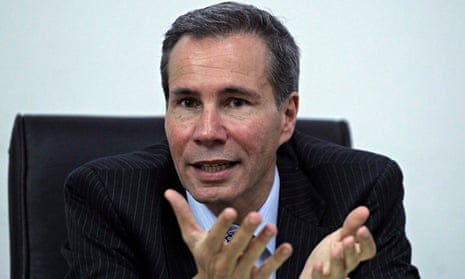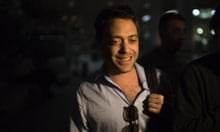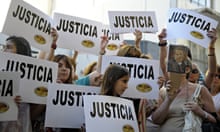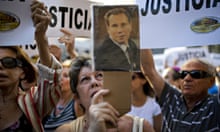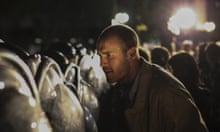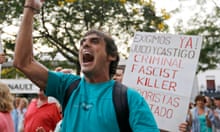An Argentinian prosecutor who accused President Cristina Fernández de Kirchner of orchestrating a cover-up in the investigation of Iran over the 1994 bombing of a Jewish community centre has been found dead in his apartment.
Alberto Nisman, who had been looking into the blast at the AMIA Jewish community centre in Buenos Aires that killed 85 people, claimed last week that Fernández had conducted secret negotiations with Iran through non-diplomatic channels, offering to cover up the suspected involvement of Iranian officials so Argentina could start swapping grain for much-needed oil from Iran.
Nisman was found dead late on Sunday night in the bathroom of his apartment on the 13th floor of the luxury Le Parc tower complex in the expensive Puerto Madero neighbourhood of Buenos Aires. The Argentinian security ministry said a .22 calibre handgun and a shell casing were found next to his body.
The ministry said Nisman’s security guards had alerted his mother on Sunday afternoon that he was not answering his front door or phone, and the Sunday papers were still on his doorstep.
Nisman’s mother found the door to his flat locked from the inside and had to get a locksmith to open it. She found her son’s body on the floor of the bathroom, blocking the entrance, and called the police.
Investigating prosecutor Viviana Fein said the preliminary autopsy found “no intervention” of others in Nisman’s death. However, Fein said she would not rule out the possibility that Nisman was “induced” to suicide because the gun was not his.
“The firearm belonged to a collaborator of Nisman,” Fein told Todo Noticias television channel. “He had had it a long time.”
According to the autopsy, Nisman had a bullet entry-wound on the right side of his head but there was no exit wound. His body was found inside the bathroom and blocking the door, which was locked from the inside and didn’t appear to be forced, Fein said.
The findings left more questions than answers about the death, which came only five days after Nisman accused Fernandez and other officials of reaching a deal with Iran that shielded some officials from possible punishment for the attack.
Nisman presented a 300-page document in court last Wednesday, based on phone wiretaps that he claimed showed close aides of the president involved in secret negotiations with Iran to withdraw Interpol arrest warrants for the suspects as a step towards normalising bilateral relations.
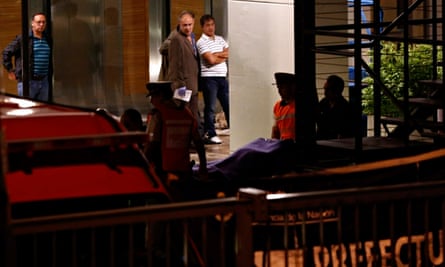
The judge handling the case of the 1994 bombing criticised Nisman late last week for taking it upon himself to “initiate an investigation without judicial control” and said his evidence was flawed.
The Argentinian cabinet chief, Jorge Capitanich, had said Nisman’s allegations were “crazy, absurd, illogical, irrational, ridiculous, unconstitutional”.
Nisman feared that the government would unearth salacious rumours against him and told the press last week: “I have told my 15-year-old daughter to be prepared to hear terrible things about her father.”
Patricia Bullrich, of the opposition PRO party, said Nisman told her on Saturday that he had received death threats. She also told television channel TN that members of parliament would meet on Monday morning to discuss the situation.
Argentina’s courts have accused Iran of sponsoring the 1994 bombing, a charge the Islamic republic denies.
In 2013, Fernández tried to form a truth commission with Iran to jointly investigate the attack. She said at the time that the pact would reactivate the inquiry, but Israeli and Jewish groups said the move threatened to derail criminal prosecution of the case.
The truth commission pact was later struck down by an Argentinian court.
The Fernández government had already been severely rocked last year by corruption charges against her vice-president, Amado Boudou, and other government officials, as well as by growing inflation and a foreign debt default in July.
The AMIA community centre bombing
The unsolved terrorist bomb attack against the AMIA Jewish community centre in downtown Buenos Aires 20 years ago remains to this day a painful wound for both the country and the Jewish community in particular.
Killing 85 mainly Jewish victims and injuring hundreds of others, the blast came only two years after a similar bomb had razed the Israeli embassy in Buenos Aires in 1992. That blast also remains unsolved and killed 29 people, plus one suicide bomber, including four Israeli civilians.
Both blasts affected surrounding buildings and sent plumes of smoke billowing over the city of Buenos Aires that could be seen from a long distance away.
The judicial investigation into both blasts has been mired in confusion and charges of cover-ups since it began, with competing Syrian and Iranian leads being pursued at different times. Finally, in 2007, at Argentina’s request, Interpol issued arrest warrants against six Iranian officials suspected of instigating the attack.
Among them was Iran’s cultural attache in Buenos Aires at the time of the blast, Mohsen Rabbani, who is suspected of masterminding the attack.
Nisman, who had been lead prosecutor in the case for the past 10 years, was firmly convinced of Iran’s involvement.
He claimed that Argentinian officials had offered to drop charges against the Iranians in exchange for oil, in phone conversations that the prosecutor claimed took place between Buenos Aires and Rabbani in Iran.
